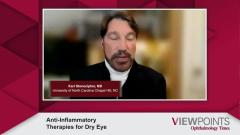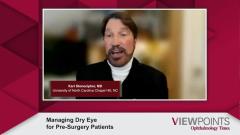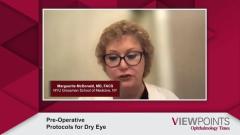
A Comprehensive Care Network: When to Refer Dry Eye
Experts offer clinical advice and when to refer patients to specialists and the importance of building a supportive care network for patients.
Episodes in this series

Transcript
Marguerite McDonald, MD, FACS: The 3 of us are cornea specialists, and I’m proud that I tune-up my colleagues’ desperately dry-eyed patients, and return those patients to them for cataract surgery. I never steal the case. But when should a comprehensive ophthalmologist refer a patient to a cornea or a dry-eye specialist for a tune-up prior to cataract surgery? What is a red flag that would [indicate it’s] time to refer?
Peter McDonnell, MD: A lot of comprehensive ophthalmologists have gotten heavily involved in this area and feel very comfortable with managing these patients. But some don’t, or they haven’t trained their staff the way we heard Karl has trained his. They may not feel they have the time to go through all that with the patient and do the things that need to be done. I think one reason is if you have a partner in your area as a cornea external disease specialist who does have a particular interest in this area, you can partner with that individual and say to the patient…to get this problem tuned-up that you have now, and then you’ll come back and we’ll do the surgery. If there’s any significant underlying problem—we didn’t really mention Sjögren syndrome earlier, but let’s say the patient has a systemic immune disorder like Sjögren syndrome. Maybe that’s better managed by someone who sees patients like that frequently [and who] maybe has access to rheumatologists that they could involve in the patient’s care to treat that underlying problem. They can always go ahead and have their cataract surgery. But particularly if there’s something out of the ordinary, something that worries the comprehensive ophthalmologist, or the comprehensive ophthalmologist just doesn’t have interest or [the] practice isn’t set up to take care of patients like that with this chronic dry eye problem, then referral is very appropriate.
Transcript was AI-generated and edited for clarity.
Newsletter
Don’t miss out—get Ophthalmology Times updates on the latest clinical advancements and expert interviews, straight to your inbox.




































